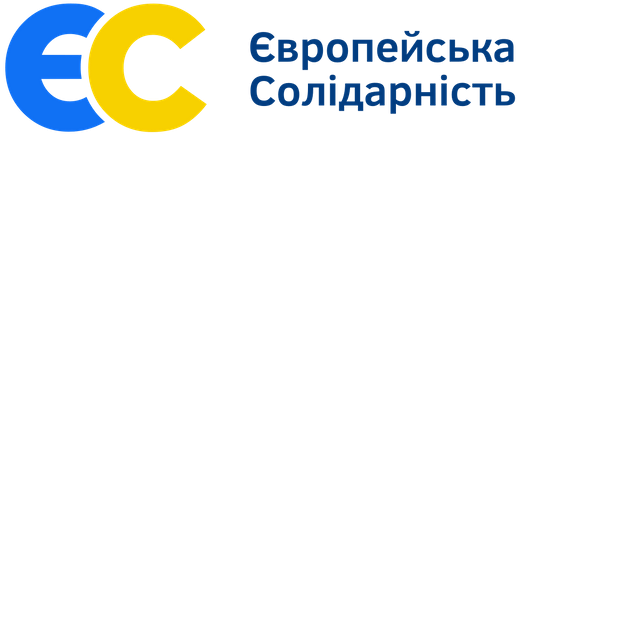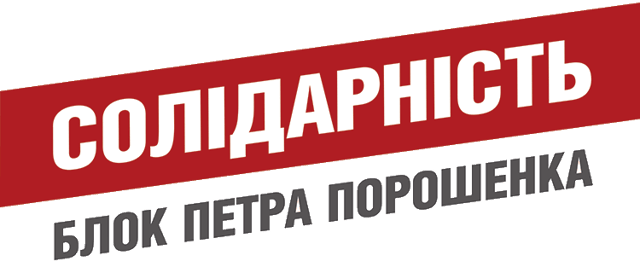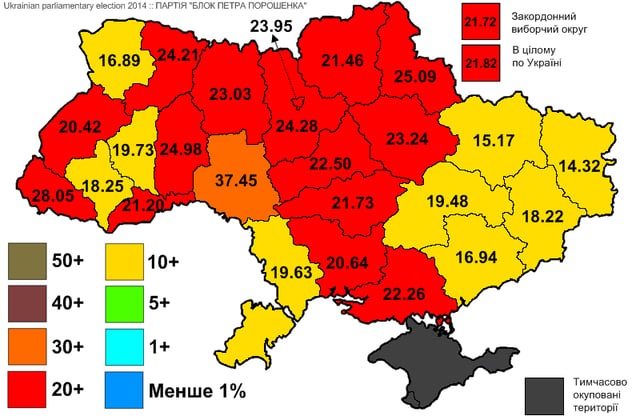Petro Poroshenko Bloc "Solidarity"

Petro Poroshenko Bloc "Solidarity"

European Solidarity Європейська солідарність | |
|---|---|
| Leader | Petro Poroshenko |
| Founded | 5 May 2000 |
| Split from | Social Democratic Party of Ukraine (united) |
| Headquarters | Kiev |
| Ideology | Liberal conservatism[1][2] Christian democracy[2] Civic nationalism[3][4] Pro-Europeanism[2] Liberalism[5] Formerly: Social democracy[2] |
| Political position | Centre-right[2] |
| European affiliation | European People's Party (observer)[6] |
| Colours | Blue Yellow |
| Slogan | Time to Unite |
| Verkhovna Rada[7] | 27 / 450 |
| Regions (2015)[8] | 8,804 / 158,399 |
| Website | |
| eurosolidarity.org [62] | |
| |
In October 2017, the party had about 30,000 members; former members of Party of Regions are denied membership.[14]
European Solidarity Європейська солідарність | |
|---|---|
| Leader | Petro Poroshenko |
| Founded | 5 May 2000 |
| Split from | Social Democratic Party of Ukraine (united) |
| Headquarters | Kiev |
| Ideology | Liberal conservatism[1][2] Christian democracy[2] Civic nationalism[3][4] Pro-Europeanism[2] Liberalism[5] Formerly: Social democracy[2] |
| Political position | Centre-right[2] |
| European affiliation | European People's Party (observer)[6] |
| Colours | Blue Yellow |
| Slogan | Time to Unite |
| Verkhovna Rada[7] | 27 / 450 |
| Regions (2015)[8] | 8,804 / 158,399 |
| Website | |
| eurosolidarity.org [62] | |
| |
History
Solidarity (2000–2013)
The party started in 2000 as a parliamentary faction called "Solidarity",[9] set up by Petro Poroshenko, until then a member of the Social Democratic Party of Ukraine (united) faction.[15][16] Taras Kuzio claims that this happened with the help of then President Kuchma, who allegedly wanted to limit the influence of the SDPU(u).[15] Many deputies elected in 1998 for the Peasant Party of Ukraine and Hromada joined the new parliamentary faction.[15][17] Based on his parliamentary faction Poroshenko eventually established the Party of Ukraine's Solidarity.[17][18] In 2000 that party merged into what would become the Party of Regions (later to become for a period the biggest party of Ukraine[19]) and Poroshenko became a Party of Regions deputy.[17]
In 2001, Poroshenko expressed interest in the creation of the Our Ukraine Bloc.[17] However, in order to receive quote in Our Ukraine he had to join the bloc with his whole party.[17][20] The Party of Ukraine's Solidarity failed to break away from the Party of Regions, therefore Poroshenko decided to create a new phantom party with a similar name, the party "Solidarity".[17] At the 2002 parliamentary elections Solidarity was able to join Our Ukraine.[21] Top party members who received a parliamentary mandate on party list of the Our Ukraine electoral bloc in 2002 were Volodymyr Plyutynsky, Volodymyr Makeyenko, Eduard Matviychuk, Anatoliy Korchynsky, while a single constituency in Vinnytsia Oblast was won by Petro Poroshenko.
After 2002, Solidarity stopped participating in elections.[9][22] In 2004, the party left Our Ukraine, and was represented by 23 deputies in the Verkhovna Rada (the forming of new factions whose parties were not directly elected into parliament was not unique in Ukraine at the time.)[23] In March 2013 the Ministry of Justice asked the Central Election Commission of Ukraine for evidence that Solidarity had not been involved in elections since 2003.[17]
On 17 June 2013, Fatherland member of parliament Yuriy Stets became head of the party.[20] Stets was a member of the united opposition's political council.[20]
On 16 October 2013, a court cancelled the registration certificate of Solidarity.[17] The party could have challenged this on appeal, but did not[17] and was legally eliminated on 31 December 2013 "due to lack of reporting".[24] and because for more than 10 years had not participated in any election.[17]
Petro Poroshenko Bloc (2014–2019)

Petro Poroshenko Bloc logo

Party support (% of the votes cast) in different regions of Ukraine (in the 2014 parliamentary election).
Early in 2014 Poroshenko became leader of the National Alliance of freedom and Ukrainian patriotism "OFFENSIVE", which was renamed "All-Ukrainian Union Solidarity".[17][24] By doing so, Poroshenko de facto prolonged the life of Solidarity and de facto merged the National Alliance of freedom and Ukrainian patriotism "OFFENSIVE" into Solidarity[17][24] (legally the original party "Solidarity" does not exist anymore[17][24]). National Alliance of freedom and Ukrainian patriotism "OFFENSIVE" was registered in May 2000 under the name All-Ukrainian Party of Peace and Unity (Ukrainian: Всеукраїнська партія миру i єдності, HPEM). It was not allowed to participate in the electoral alliance "Rainbow" in the Ukrainian 2002 parliamentary elections.[25] In the 2006 elections, the party failed as part of the electoral alliance Yuriy Karmazin Bloc to win parliamentary representation.[25] In the 2007 elections, the party failed again as part of the All-Ukrainian Community to win parliamentary representation.[25] After this election (the party) "All-Ukrainian Party of Peace and Unity" was renamed National Alliance of Freedom and Ukrainian patriotism "OFFENSIVE".[26] National Alliance of freedom and Ukrainian patriotism "OFFENSIVE" did not participate in the 2012 parliamentary elections.[27]
On 2 September, Vitali Klitschko, then parliamentary leader of the Ukrainian Democratic Alliance for Reform, stated that since his party and the Petro Poroshenko Bloc had agreed to joint participation in parliamentary elections on 29 March 2014, the two parties were in discussion about running a joint list at the October 26 parliamentary election.[34] On 15 September it became clear that 30% of the Petro Poroshenko Bloc election list would be filled by members of UDAR and that UDAR leader Klitschko was at the top of this list, Klitschko vowed not to resign as incumbent Mayor of Kiev.[35] According to political scientist Tadeusz A. Olszański (in mid-September 2014) this deal with UDAR "enables it to use that party's large-scale structures, which the Poroshenko Bloc itself lacks".[36]
The party won the parliamentary election with 132 seats, beating the runner-up People's Front, who won 82 seats.[11] People's Front was first in the nationwide party vote (22.14% against 21.81%) but the party won 69 constituency seats while People's Front won only 18.[11] On 27 November 2014, the party formed a parliamentary faction of 145 people (at the opening session of the new parliament).[37]
Top 10 politicians on the party list to the Ukrainian parliament: 1. Vitaliy Klychko, 2. Yuriy Lutsenko, 3. Olha Bohomolets, 4. Volodymyr Hroysman, 5. Mustafa Dzhemilev, 6. Yuliy Mamchur, 7. Maria Matios, 8. Mykola Tomenko, 9. Iryna Herashchenko, 10. Vitaliy Kovalchuk.
According to Ukrainian media research of February 2016 22% of the parties' representatives in regional councils and 12% of the parties' parliamentary deputies were former members of the Party of Regions.[43]
Klitschko resigned as Petro Poroshenko Bloc chairman (on 26 May) after a new law barring him as head of the Kiev City State Administration to be chairman or a member of a political party took effect on 1 May 2016.[47]
On 18 May 2019 Klitschko announced that UDAR would take part in the 2019 Ukrainian parliamentary election autonomously.[13]
European Solidarity (from 2019)
Top 10 politicians on the party list to the Ukrainian parliament in these elections are 1. Petro Poroshenko, 2. Andriy Parubiy, 3. Iryna Herashchenko, 4. Mykhailo Zabrodskyi, 5. Sofia Fedyna, 6. Mustafa Dzhemilev, 7. Yana Zinkevych, 8. Oleh Synyutka, 9. Akhtem Chyihoz, 10. Ivanna Klympush-Tsintsadze.[50]
In the 2019 parliamentary election 37% of the party's elected deputies were women.[51]
Ideology and positions
The party officially decries populism and advocates for pragmatism and realism.[52] According to Oleg Varfolomeyev of the Eurasia Daily Monitor the party is a liberal party (and UDAR was as well).[53] According to Bohdan Butkevych of The Ukrainian Week, the party does not have an ideological unity.[54] Due to the fact the party was created shortly before the 2014 Ukrainian parliamentary election and then its "party list was drawn up by taking almost anyone who was ready and willing to invest their own resources".[54] Hence its parliamentary faction consists of people who "have very different interests, methods of getting into parliament and plans".[54] (Hence) the party's MPs tend not to vote alike.[54]
Open list elections
Creating a public television network
Bringing attention to the plight of the Crimean Tatars
Ensuring language rights for Russian speakers while maintaining Ukrainian as the sole official language
Membership of Ukraine in the European Union
Welfare and social protection for poor citizens
Law enforcement reform and creation of an independent judiciary
Ending corruption
Ensuring Ukraine's territorial integrity
Energy independence for Ukraine
Abolishing the immunity of senior officials[56]
Privatizing all Ukrainian coal mines and liquidate or mothball all mines that cannot be privatized, with social support for the workers of the liquidated or mothballed mines and the population of these territories[57]
Legislation to restrict religions whose leadership reside in aggressor states, e.g. Russia.[58]
As to the War in Donbass, the party advocates an end to the conflict by peaceful means.[36]
Party leaders
- Solidarity
- All-Ukrainian Party of Peace and Unity/National Alliance of freedom and Ukrainian patriotism "OFFENSIVE"
| Date | Party leader |
|---|---|
| 2000–???? | Lyudmyla Yankovska[25] |
| 2013–???? | Ivanenko Yuriyovych, Sekel Mikhailovich, Yuri Khorlikov |
- Petro Poroshenko Bloc
| Date | Party leader |
|---|---|
| 2014–2015 | Yuriy Lutsenko |
| 2015–2019 | Vitali Klitschko |
- European Solidarity
| Date | Party leader |
|---|---|
| since 2019 | Petro Poroshenko |
Election results
Election results for Solidarity political party and Petro Poroshenko Bloc.
Verkhovna Rada
- Solidarity
| Year | Popular vote | % of popular vote | Overall seats won | Seat change | Government |
|---|---|---|---|---|---|
| 2002 | Our Ukraine | 5 / 450 | Opposition | ||
- All-Ukrainian Party of Peace and Unity
| Year | Popular vote | % of popular vote | Overall seats won | Seat change | Government |
|---|---|---|---|---|---|
| 2006 | Yuriy Karmazin Bloc | 0 / 450 | Extra-parliamentary | ||
| 2007 | All-Ukrainian Community | 0 / 450 | Extra-parliamentary | ||
- Petro Poroshenko Bloc
| Year | Popular vote | % of popular vote | Overall seats won | Seat change | Government |
|---|---|---|---|---|---|
| 2014 | 3,433,336 | 21.83% | 132 / 450 | Coalition government |
- European Solidarity
| Year | Popular vote | % of popular vote | Overall seats won | Seat change | Government |
|---|---|---|---|---|---|
| 2019 | 1,184,515 | 8.10% | 25 / 450 | Opposition |
Presidential elections
| Election year | Candidate | of 1st round votes | % of 1st round vote | of 2nd round votes | % of 2nd round vote | Won/Loss |
|---|---|---|---|---|---|---|
| 2014 | Petro Poroshenko | 9,857,308 | 54.70 | Won | ||
| 2019 | Petro Poroshenko | 3,014,609 | 15.95 | 4,512,562 | 24.46 | Loss |